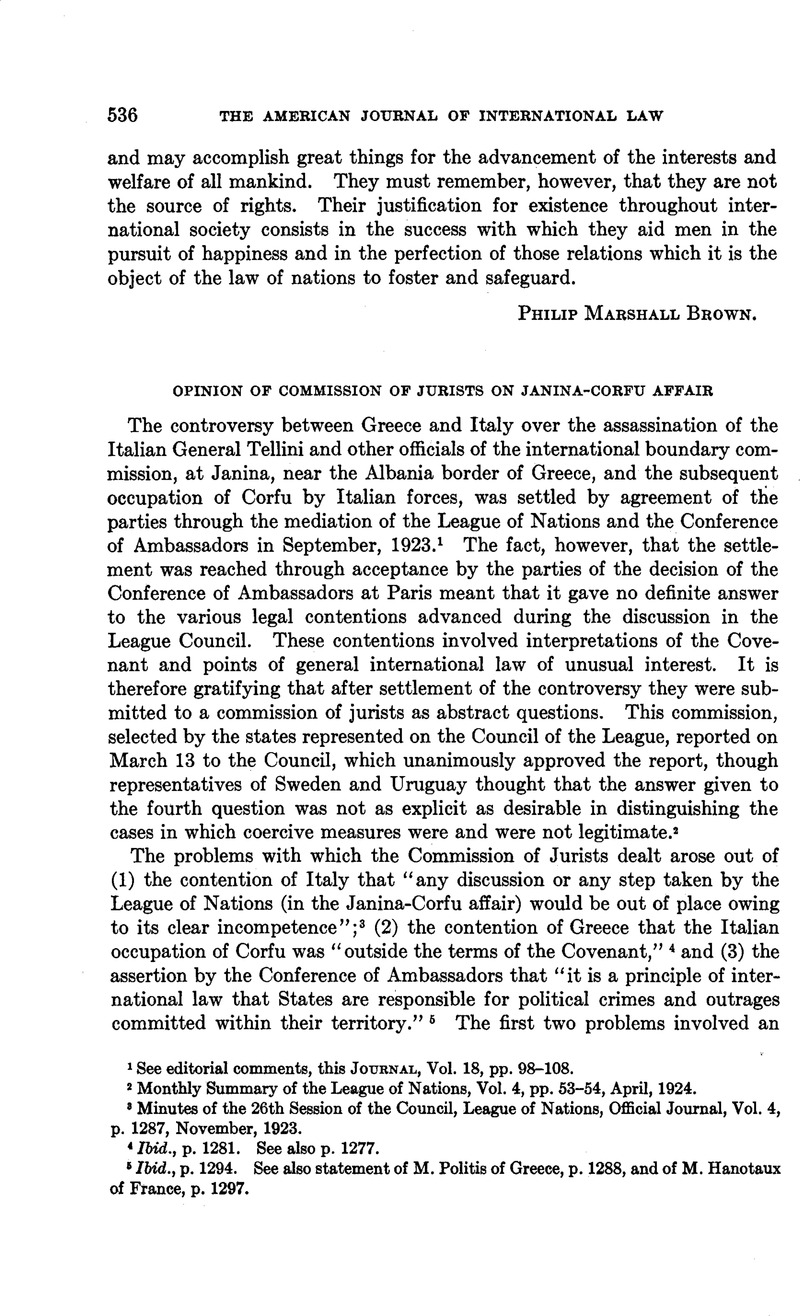Published online by Cambridge University Press: 04 May 2017

1 See editorial comments, this Journal , Vol.18, pp. 98-108.
2 Monthly Summary of the League of Nations, Vol. 4, pp. 53-54, April, 1924.
3 Minutes of the 26th Session of the Council, League of Nations, Official Journal, Vol. 4,p. 1287, November, 1923.
4 Ibid., p. 1281. See also p. 1277.
5 Ibid., p. 1294. See also statement of M. Politis of Greece, p. 1288, and of M. Hanotaux of France, p. 1297.
6 Minutes of the 26th Session of the Council, League of Nations, Official, Journal, Vol.4, pp.1320-1321.
7 Ibid., pp. 1328, 1350. See also Records of the 4th Assembly, 18th Plenary Meeting,Sept. 28, 1923, and Monthly Summary of the League of Nations, Vol. 3, p. 215, October, 1923.
8 League of Nations, Official Journal, Vol. 4, pp. 1329, 1338, 1339.
9 League of Nations, Official Journal, Vol. 4, pp. 1338, 1340, 1342.
10 Ibid., p. 1339.
11 League of Nations, Official Journal, Vol. 4, p.1343. See also Ibid., p. 1332, and Wright, “ The Understandings of International Law,” this Journal , Vol.14, p.565.
12 Ibid., pp. 1345, 1346, 1351.
13 The jurists were Adatci, Japan, Chairman; Lord Buckmaster, British Empire; Buero,Uruguay; de Castello Branco Clark, Brazil; Fromageot, France; Rolandi Ricci, Italy;Unden, Sweden; Van Hamel, Director of the Legal Section of the League Secretariat; de Villa Urrutia, Spain; de Visscher, Belgium. See Monthly Summary of the League of Nations, Vol. 4, p. 2, February, 1924.
14 For replies, see Monthly Summary of the League of Nations, Vol. 4, p. 53, April,1924.
15 See statement bySalandra, M. of Italy, League of Nations, Official Journal, Vol. 4,p. 1288.Google Scholar
16 See statements by M. Salandra, Ibid., p p . 1279,1314; by Lord Robert Cecil, p p . 12791280,1298,1307-1308; by M. Hymans of Belgium, p . 1299; and by M. Guani of Uruguay,p . 1300. See also this Journal , Vol. 18, p . 107.
17 See statement by M. Salandra, League of Nations, Official Journal, Vol. 4, pp. 1279,1288.
18 See statement by M. de Mello-Franco of Brazil, Ibid., p. 1330.
19 See statement by M. Guani of Uruguay, Ibid., p. 1329.
20 See official Italian statement, Ibid., p. 1288, and elaborate argument by M. Salandra of Italy, p. 1314. The opposing view was vigorously expressed by Branting M. of Sweden,Ibid., pp. 1306,1316. See also this Journal , Vol.18, p.107.
21 Professor Charles de Visscher, one of the jurists who prepared the report, has informed the writer that in his opinion Article 12 bars resort to all measures of coercion characterized by the use of force, because such measures in themselves always endanger the maintenance of peace. Measures of forcible coercion, it is true, have not always in the past led to war,but only because the state coerced is physically weak. Relative strength or weakness makes no difference in the rights of states; therefore, any act of coercion which, if applied against a great power, would inevitably lead to war, is legally the inauguration of war, whatever the relative strength of the states, and so is barred by the Covenant.
22 This seems to be the logical interpretation of the answer, but Professor de Visscher informs the writer that, in approving the answer, he interpreted the term “ dispute”in the third line to refer, not to the dispute as to the propriety of the coercive measures, but to the original dispute out of which the acts of coercion arose. Thus the answer, in his opinion,does not mean that the Council has power to pass upon the propriety of the coercive measures (which he believes are always prohibited by the Covenant if they involve the use of force), but merely upon the expediency, from the standpoint of settling the original dispute,of the maintenance or withdrawal of such measures which exist in fact.
23 Ibid., p. 1277.
24 Message to Congress, December 3,1901.
25 League of Nations, Official Journal, Vol. 4, pp. 1277-1278.
26 Ibid., pp. 1323, 1339.
27 League of Nations, Official Journal, Vol. 4, p. 1289.
28 Ibid., p. 1297. See also statement by M. Guani of Uruguay, p. 1324.
29 See Borchard, Diplomatic Protection of Citizens Abroad, pp. 213, 217. The InterAllied Commission of Inquiry on responsibility for the murder of General Tellini proceeded on this theory of responsibility. In its final report of September 30, 1923, it found that Greece had been negligent in not suppressing the press campaign against General Tellini and in not warning him of the anti-Italian feeling in that region before the crime; in not making use of all available evidence in the judicial inquiry; and in not transmitting information immediately on discovering the crime which might have prevented escape of the criminals.See Levermore, League of Nations, 4th Year Book, pp. 402-409.
30 Ibid., pp. 216, 223.